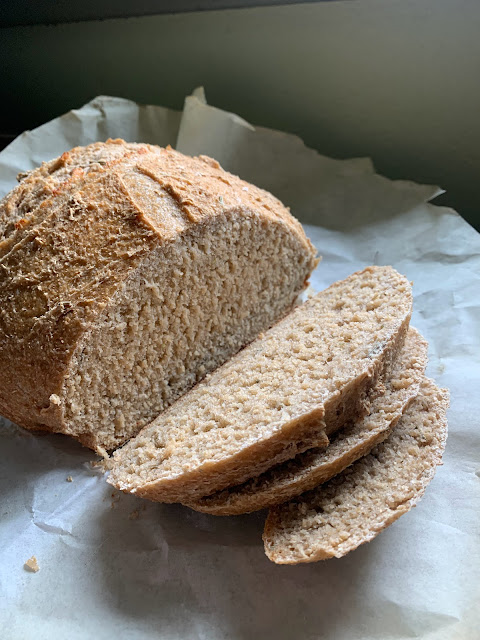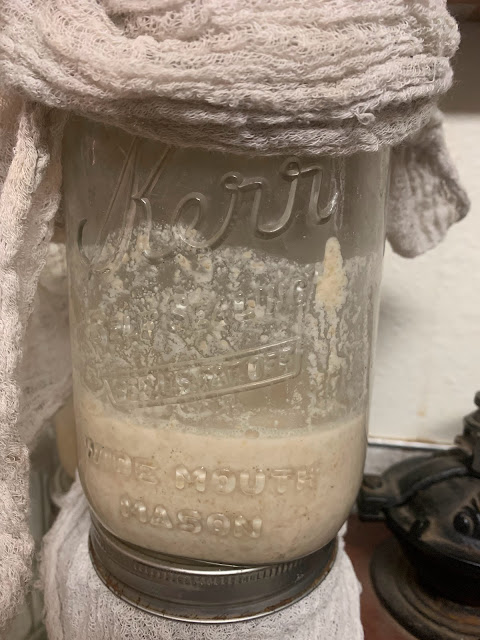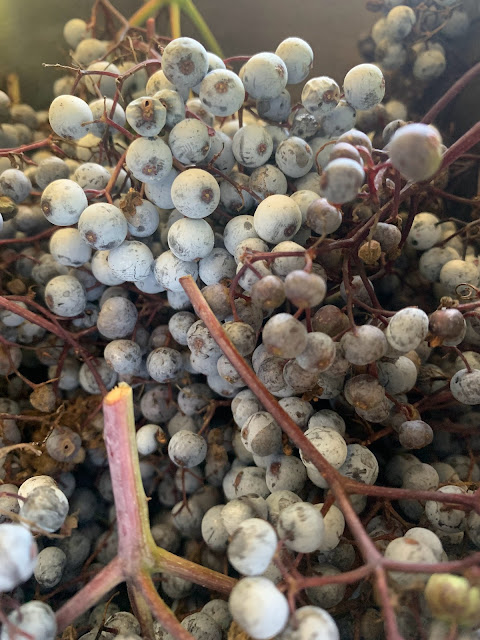Whole Wheat Sourdough is so tricky! There're sooo many variables involved! I have found a method that I love and I'd love to share it with you!
My main trick with making sourdough 100% whole wheat is that the starter needs to grow from whole wheat yeast and will do even better if it is local! Did you know that each sourdough microbiome (lactic acid bacteria and yeast) is unique? And it adapts to incorporate the local, airborne mycology. That's why, even if you brought sourdough starter from San Francisco, within a short period of time it's flavor and texture will adjust to whatever the local yeasts taste like! (1)
My second bit of advice is to make sure your starter stays highly hydrated. Equal flour to water ratio seems to work well, but the better hydrated the starter is the higher the acidity (tartness). (2) While the starter will collect natural, wild yeasts and bacteria from the ambient air, I like to give mine a boost with the natural microbes from the blue elderberry that are ripe this time of year. (3) When I harvest elderberries for medicinal syrup, I soak the berries in water. Afterward, I take the strained water to mix with the whole wheat flour to begin my starter.
Whole Wheat, Herbed Sourdough
Whole Wheat Sourdough Starter:
Ingredients:
1. 3 cups whole wheat flour, divided
2. 3 cups water, divided
3. 1/2 cup elderberries
Soak elderberries in water overnight to leech the natural yeast. Strain and use elderberries in another recipe or freeze for later. Mix 1c water with 1c flour in a large jar and cover tightly with cheesecloth or linen, allowing to rest in warm place. Each day for the next 4 days, remove 1/2c to use in a separate recipe and stir in a new 1/2c flour and 1/2c water. Then use for following bread recipe or store in the fridge, repeating the feeding process once per week, allowing rest in warm place for at least 4 hours.
Ingredients:
1. 3 1/2 cups whole wheat flour
2. 1 cup water
3. 1 Tbsp salt
4. 4 Tbsp dried herbs (I used rosemary, thyme, and lemon balm)
5. 1 cup starter (at least 4 hours past last feeding)
- Mix all ingredients: dough will absorb more water over time. Adjust adding flour or water until it’s just thicker than batter, but very moist dough. (Morning, day before)
- Fermentation: once mixed, cover bowl with towel and rest in warm place 30 min. Stretch and fold, then rest 30 more minutes.* Repeat stretch, fold, and rest 30 min two more times. After the third time, allow dough to continue to rest another 4 1/2 hours in warm place. *If dough is too runny to stretch and fold, slowly add more flour, 1/4 c at a time. (Morning, day before)
- Shaping: remove dough from mixing bowl and shape on counter. May continue to dust with flour to keep from sticking. Rest 30 min, then flip seam-side-up into large bowl. (Evening, day before)
- Proofing: cover in linen and allow the dough to proof overnight or up to 24 hours in fridge or cold place. (Evening, day before)
- Scoring: preheat oven to 450*F with lidded dutch oven inside. Remove dough from fridge and flip it out onto parchment paper. Score as desired, at least once. May sprinkle with additional herbs at this time. When dutch oven is to temp, carefully remove from oven and set parchment paper with dough inside. Cut of excess paper and replace lid (Day of)
- Baking: Place lidded dutch oven inside preheated oven and bake at 450*F for 20 min, then remove lid and bake another 20 minutes. Remove from oven and allow to cool at least 1 hr. Before slicing.
- Dees, J. PhD. (June 26, 2020) American Society for Microbiology. Last Visited September 11, 2023 from https://asm.org/Articles/2020/June/The-Sourdough-Microbiome
- Modernist Cuisine (September 26,2018) "Sourdough Science". Last Visited September 11, 2023 from https://modernistcuisine.com/mc/sourdough-science/
- Haaker, Meredith L. (December 2022) Raising Native Plant Awareness as a Method for Re-Naturalization. Last Visited September 11, 2023 from https://digitalcommons.calpoly.edu/socssp/169/





No comments:
Post a Comment